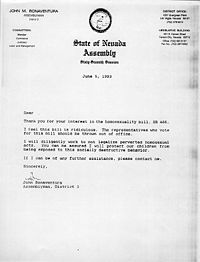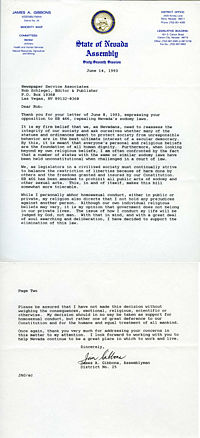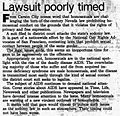Senate Bill 466
SB 466: Repealing Nevada’s Sodomy law
(c)Dennis McBride, 2009
"Infamous Crime Against Nature"
On October 30, 1861 the Legislative Assembly of the Territory of Nevada passed an act adopting the Common Law of England as Nevada's territorial law. Chapter 28, section 45, approved November 26, 1861, read, "The infamous crime against nature, either with man or beast, shall subject the offender to be punished by imprisonment in the Territorial prison for a term not less than five years, and which may extend to life." The infamous crime against nature evolved from English buggery laws, defined as homosexual or heterosexual anal intercourse and bestiality, all of which were referred to in Scottish law as sodomy.[1]
For more than a hundred years what became known as Nevada Revised Statute [NRS] 201.190—Nevada's sodomy law—was used to terrify, blackmail, and persecute gay men by associating them with bestiality, pedophilia, and rape. With that law in place, the history of gay people in Nevada until the last half of the 20th century is largely a history of criminal prosecution.
First Attempts to Repeal the Law
There were several unsuccessful challenges of 201.190,[2] but it wasn't until 1993 that that statute at last was repealed--and not as the result of a court order, but through legislation passed willingly by the Nevada State Legislature.
Mobilizing Support
In April 1991, Las Vegas Bugle publisher Rob Schlegel and Ken Tomoroy--a co-founder of the Names Project in Nevada--formed a political organization called Citizens for Equal Justice [CEJ] whose intent was to work toward establishing equal rights for Nevada's gay citizens, including an effort to repeal NRS 201.190 in the 1993-94 legislative session. At the group's second meeting on December 17 1991, the name was changed to Nevadans for Constitutional Equality [NCE]. Among the 30 people who attended that meeting were Schlegel and Tomoroy, gay political advocate and columnist Lee Plotkin, Tyrone Smith, Ted Giordano, attorney Kevin Kelly, activist Judy Corbisiero, and Dr. Jerry Cade, who at that time was chairman of the anti-discrimination sub-committee of the Nevada Statewide AIDS Advisory Task Force, which, in 1992, had urged the legislature to repeal NRS 201.190 as a tool for fighting the AIDS epidemic.[3] NCE contrived a careful strategy: NCE lobbyists would persuade an unlikely legislator, preferably a Northern Nevadan, to introduce legislation to repeal the sodomy law near the end of the session so the state's conservative forces wouldn't have time to mount opposition.[4]
At the same time the NCE was plotting strategy, a group of wealthy, well connected A-Gays from southern Nevada was planning a behind-the scenes assault on NRS 201.190, intending to use their money and professional and political connections in the legislature to get the sodomy law repealed. Among these were physician Mel Pohl and his lover, Deniston Kay, and businessmen Joe Lamarca, Bob Forbuss, and Dan Burdish.[5] But there was a random factor coming into the picture that no one foresaw: Democratic Nevada State Senator Lori Brown, elected in 1992 from District 7 in Las Vegas. Brown didn't know about Nevadans for Constitutional Equality, nor the southern Nevada A-Gays, and when she requested a bill draft [SB 466] to repeal the state's sodomy law, it came entirely from her own belief in equality for all Nevada's citizens.[6]
Brown's request caught the gay community by surprise, which had no choice but to combine resources and get behind her. SB 466 began its journey through the Nevada legislature on May 13, 1993 when it was introduced through the Senate Commerce and Labor Committee by Republican Senator Randolph Townsend.[7]
One of these connections was Robert "Bob" Fulkerson, director in 1993 of the progressive organization Citizen Alert. Fulkerson's vast connections throughout northern Nevada, combined with Corbisiero's connections across the state, provided an unprecedented cross-constituent support for repealing the state's sodomy law.[8]
"The Issue is Freedom"
Despite the support SB 466 enjoyed, its journey through the legislature wasn't smooth. Mormon legislators, such as Assemblyman Tom Collins, were particularly nasty in their opposition. Others, such as Ray Rawson, Bill O'Donnell, and fundamentalist christian Ann O'Connell, took every opportunity to set hurdles. Assemblyman John Bonaventura exhibited a sign at his legislative desk which read, No Special Rights for Sodomites.
Many of the state’s usual cast of homophobic organizations attended hearings to speak against SB 466, including the Nevada Coalition of Concerned Citizens, the Independent American Party, the Nevada Families Eagle Forum, and Nevada Eagle Women. Dr. Paul Cameron, a discredited psychologist who led the homophobic Family Research Institute, noted an "exceptionally high rate of heart attacks" among gay men which he believed "might be related to the use of the rectum for sexual pleasure."[9]
Support came from several respected scholars and religious figures who supplied affidavits in favor of repeal. These included Las Vegas's Rabbi Mel Hecht of the Reform Movement of Judaism; Rev. H. Darrell Lance, the widely published professor of Old Testament interpretation who easily demolished the opposition's claims of biblical proscription of homosexuality; and historian John Boswell, author of Christianity, Social Tolerance, and Homosexuality and Same-Sex Unions in Premodern Europe. In the legislature, African-American Senator Joe Neal spoke eloquently in favor of repeal, while Clark County’s Republican Senator Mark James gave a stirring speech in which he said, "The issue here is not gay rights. It is not morality, nor is it the criminal law. The issue is freedom. The question is whether government can go this far into the homes and private lives of the people of this state. This bill says 'No, this is where we draw the line.' ... Mr. President pro Tempore, … every morning you lead us in the pledge of allegiance to the flag and we all pledge 'liberty and justice for all.' ... Well, my fellow senators, 'all' means 'all.' It does not mean 'some.' "[10]
Image Gallery
Notes
- ↑ Laws of the Territory of Nevada (1861), chapter 28, section 45; The Wolfenden Report: Report of the Committee on Homosexual Offenses and Prostitution (New York, NY: Lancer Books, 1964), 61-62.
- ↑ State of Nevada vs Frank Benites, Case No. 10,366 (1914); State of Nevada vs Allan,2182 27A, 26149 – 26153 (1973); Allan vs State of Nevada, 91 Nev. 650, 653, 541 P.2d 656, 658 (1975); Parole Progress Reports, NSP 11569 (September 1978, August 1979); John Doe, et. al. vs Richard Bryan, Governor of the State of Nevada, First Judicial District Court of the State of Nevada, Case No. 85-01462-A (1985), MS #2000-01, Rodney Sumpter Papers, Special Collections, University of Nevada, Las Vegas Lied Library (hereinafter noted as UNLV SC); John Doe et. al. vs Richard Bryan, Case No. 16978, Supreme Court of the State of Nevada (1986), MS #2000-02, Rodney Sumpter Papers, UNLV SC; Knoll vs State of Nevada, Petition for Writ of Habeas Corpus, Case No. #24009 (1993); Las Vegas Sun, February 5, 1993; Las Vegas Review-Journal/Las Vegas Sun, February 6, 1993.
- ↑ Robert “Rob” Schlegel, interviews by Dennis McBride, March 9-11 and 21-22; April 11, 1998, transcript, in the author's possession; Jerry Cade, interviews by Dennis McBride, February 8, May 17, June 21, July 26, November 1 and 22, 2003; transcript, in the author’s possession; Judy Corbisiero, interviews by Dennis McBride, September 5, 2003; May 21, July 2, and December 10, 2004; transcript, in the author’s possession; Las Vegas Bugle, May 1991; Las Vegas Bugle, November 1991; Las Vegas Bugle, June/July 1993; Nevadans for Constitutional Equality, February 18, 1992, meeting minutes, in the author’s possession; Las Vegas Bugle, April/May 1992; Las Vegas Bugle, June 1992.
- ↑ Schlegel interview.
- ↑ Corbisiero interview; Schlegel interview; Kevin Kelly, interview by Dennis McBride, September 8, 22, and November 10, 2000, transcript, in the author’s possession; Lee Plotkin, interview by Dennis McBride, August 2, 10, and 16, and October 4, 2006, transcript, in the author’s possession; Gudrun Fonfa, interview by Dennis McBride, June 15 and 22, 2008, transcript, in the author’s possession.
- ↑ Las Vegas Sun, May 25, 1993; Advocate, July 27, 1993; Legislative Counsel Bureau to Lori Brown, memorandum, May 13, 1993, MS #95-14, Lori Lipman Brown Papers, UNLV SC.
- ↑ Legislative History SB 466 (1993), MS #2003-26a, UNLV SC; Senate Bill 466 (original draft), MS #2003-26a, UNLV SC; Nevada State Senate Daily Journal, May 13, 1993.
- ↑ Corbisiero interview; Schlegel interview; Fulkerson interview.
- ↑ Corbisiero interview; Schlegel interview; Brown interview; Las Vegas Sun, May 26, 1993; Las Vegas Review-Journal/Las Vegas Sun, May 29, 1993; Reno Gazette-Journal, July 28, 1993; Legislative History SB 466-1993, MS #2003-26a, UNLV SC; Senate Committee on the Judiciary minutes, May 24, 1993; Legislative History SB 466-1993, MS #2003-26a, UNLV SC.
- ↑ Legislative History SB 466-1993, exhibit C (201.NV 1993), MS #2003-26a, UNLV SC; Nevada State Senate Daily Journal, May 28, 1993.








